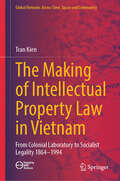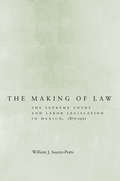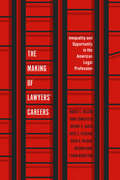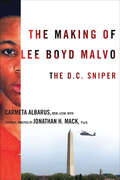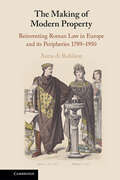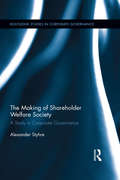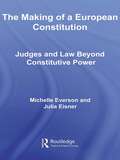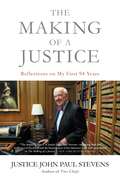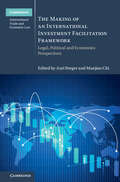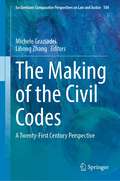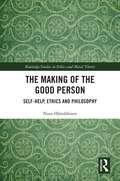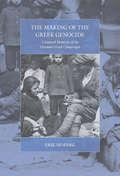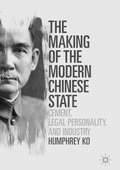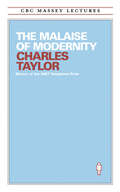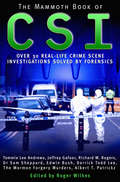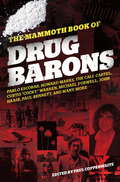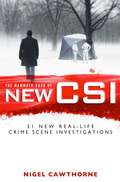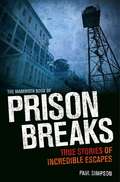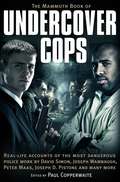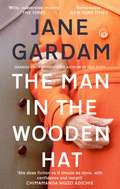- Table View
- List View
The Making of Intellectual Property Law in Vietnam: From Colonial Laboratory To Socialist Legality 1864 – 1994 (Global Vietnam: Across Time, Space and Community)
by Tran KienThis book is about the making of intellectual property law in Vietnam across colonial and socialist space and time from 1864 to 1994. It provides a completely new, provoking narrative, disproving previously published scholarship which claimed that there was no intellectual property law in Vietnam during the colonial and socialist periods. In doing so, the book engages with an emerging field of historiographical inquiry into the intellectual property law history in Vietnam and worldwide, which investigates how and why the scholarship about the history of intellectual property law has been construed and framed as such within a specific period and space. This book is comprised of three knowledge components. The first involves the reconstruction of the lost intellectual property law from 1864 to 1994 in Vietnam doctrinally. Relying on newly discovered archives in Vietnam and worldwide, it unravels a corpus of statutory and regulatory provisions and interesting, at times contradictory, juridical decisions that governed and interpreted copyright, patent, and trademark. The second is the historiographical inquiry of the making of the intellectual property law history scholarship in Vietnam. This will answer the questions of how and why the particular histories had been construed and framed as such at a particular time. This involves the debate about sociopolitical ideologies underlying the meaning and application of the laws, most notably colonialism and socialism. Finally, the third engages with the theory of legal transplantation. It addresses a hypothetical question of colonial laboratory as a form of legal transplantation: a new concept that this book offers to the global scholarship. It demonstrates that the colonial empire had tried to use Vietnam as a laboratory for its legal reform and then transplanted the successful and feasible results back to the empire. This book explains the distinctively ideological principles underlying the understanding and application of the law.
The Making of Law: The Supreme Court and Labor Legislation in Mexico, 1875-1931
by William J. Suarez-PottsDespite Porfirio Díaz's authoritarian rule (1877-1911) and the fifteen years of violent conflict typifying much of Mexican politics after 1917, law and judicial decision-making were important for the country's political and economic organization. Influenced by French theories of jurisprudence in addition to domestic events, progressive Mexican legal thinkers concluded that the liberal view of law—as existing primarily to guarantee the rights of individuals and of private property—was inadequate for solving the "social question"; the aim of the legal regime should instead be one of harmoniously regulating relations between interdependent groups of social actors. This book argues that the federal judiciary's adjudication of labor disputes and its elaboration of new legal principles played a significant part in the evolution of Mexican labor law and the nation's political and social compact. Indeed, this conclusion might seem paradoxical in a country with a civil law tradition, weak judiciary, authoritarian government, and endemic corruption. Suarez-Potts shows how and why judge-made law mattered, and why contemporaries paid close attention to the rulings of Supreme Court justices in labor cases as the nation's system of industrial relations was established.
The Making of Lawyers' Careers: Inequality and Opportunity in the American Legal Profession (Chicago Series in Law and Society)
by Robert L. Nelson Ronit Dinovitzer David B. Wilkins Bryant G. Garth Ethan Michelson Joyce S. Sterling Meghan DaweAn unprecedented account of social stratification within the US legal profession. How do race, class, gender, and law school status condition the career trajectories of lawyers? And how do professionals then navigate these parameters? The Making of Lawyers’ Careers provides an unprecedented account of the last two decades of the legal profession in the US, offering a data-backed look at the structure of the profession and the inequalities that early-career lawyers face across race, gender, and class distinctions. Starting in 2000, the authors collected over 10,000 survey responses from more than 5,000 lawyers, following these lawyers through the first twenty years of their careers. They also interviewed more than two hundred lawyers and drew insights from their individual stories, contextualizing data with theory and close attention to the features of a market-driven legal profession. Their findings show that lawyers’ careers both reflect and reproduce inequalities within society writ large. They also reveal how individuals exercise agency despite these constraints.
The Making of Lee Boyd Malvo: The D.C. Sniper
by Carmeta Albarus Jonathan MackIn October of 2002, a series of sniper attacks paralyzed the Washington Beltway, turning normally placid gas stations, parking lots, restaurants, and school grounds into chaotic killing fields. After the spree, ten people were dead and several others wounded. The perpetrators were forty-one-year-old John Allen Muhammad and his seventeen-year-old protégé, Lee Boyd Malvo. Called in by the judge to serve on Malvo's defense team, social worker Carmeta Albarus was instructed by the court to uncover any information that might help mitigate the death sentence the teen faced. Albarus met with Malvo numerous times and repeatedly traveled back to his homeland of Jamaica, as well as to Antigua, to interview his parents, family members, teachers, and friends. What she uncovered was the story of a once promising, intelligent young man, whose repeated abuse and abandonment left him detached from his biological parents and desperate for guidance and support. In search of a father figure, Malvo instead found John Muhammad, a veteran of the first Gulf War who intentionally shaped his protégé through a ruthlessly efficient campaign of brainwashing, sniper training, and race hatred, turning the susceptible teen into an angry, raging, and dissociated killer with no empathy for his victims.In this intimate and carefully documented account, Albarus details the nature of Malvo's tragic attachment to his perceived "hero father," his indoctrination, and his subsequent dissociation. She recounts her role in helping to extricate Malvo from the psychological clutches of Muhammad, which led to a dramatic courtroom confrontation with the man who manipulated and exploited him. Psychologist Jonathan H. Mack identifies and analyzes the underlying clinical psychological and behavioral processes that led to Malvo's dissociation and turn toward serial violence. With this tragic tale, the authors emphasize the importance of parental attachment and the need for positive and loving relationships during the critical years of early childhood development. By closely examining the impact of Lee Boyd Malvo's childhood on his later development, they reach out to parents, social workers, and the community for greater awareness and prevention.
The Making of Lee Boyd Malvo: The D.C. Sniper
by Carmeta Albarus&“The best explanation I have yet read for the madness that was the Beltway sniper spree can be found in the pages of [this] fascinating new book.&”—The AtlanticIn October of 2002, a series of sniper attacks paralyzed the Washington Beltway, turning normally placid gas stations, parking lots, restaurants, and school grounds into chaotic killing fields. After the spree, ten people were dead and several others wounded. The perpetrators were forty-one-year-old John Allen Muhammad, a veteran of the first Gulf War, and his seventeen-year-old protégé, Lee Boyd Malvo. In this intimate and carefully documented account, social worker Carmeta Albarus, who served on Malvo&’s defense team and researched his background, details the nature of Malvo's tragic attachment to his perceived &“hero father,&” his indoctrination, and his subsequent dissociation. She recounts her role in helping to extricate Malvo from the psychological clutches of Muhammad, which led to a dramatic courtroom confrontation with the man who manipulated and exploited him. Psychologist Jonathan H. Mack identifies and analyzes the underlying clinical psychological and behavioral processes that led to Malvo&’s dissociation and turn toward serial violence.With this tragic tale, the authors emphasize the importance of parental attachment and the need for positive and loving relationships during the critical years of early childhood development. By closely examining the impact of Lee Boyd Malvo&’s childhood on his later development, they reach out to parents, social workers, and the community for greater awareness and prevention.&“The book can be illuminating, especially when Albarus describes what it was like to pierce Malvo&’s shield and help wrest his psyche from Muhammad.&”—The Newark Star-Ledger&“Fascinating.&”—Publishers Weekly
The Making of Modern Property: Reinventing Roman Law in Europe and its Peripheries 1789–1950
by Anna di RobilantIn this original intellectual history, Anna di Robilant traces the history of one of the most influential legal, political, and intellectual projects of modernity: the appropriation of Roman property law by liberal nineteenth-century jurists to fit the purposes of modern Europe. Drawing from a wealth of primary sources, many of which have never been translated into English, di Robilant outlines how a broad network of European jurists reinvented the classical Roman concept of property to support the process of modernisation. By placing this intellectual project within its historical context, she shows how changing class relations, economic policies and developing ideologies converged to produce the basis of modern property law. Bringing these developments to the twentieth century, this book demonstrates how this largely fabricated version of Roman property law shaped and continues to shape debates concerning economic growth, sustainability, and democratic participation.
The Making of Shareholder Welfare Society: A Study in Corporate Governance (Routledge Studies in Corporate Governance)
by Alexander StyhreThe Making of Shareholder Welfare Society traces and accounts for the debates and discussions between law and economics scholars and mainstream legal scholars, management theorists, and economic sociologists. This is done in detail to demonstrate that the shareholder welfare society was built from the bottom up, beginning with theoretical propositions regarding alleged market efficiencies and leading all the way to the idea that a society characterized by economic freedom and efficiency maximization pave the way for uncompromised shareholder welfare, in turn being good for everyone. This book is of relevance for a variety of readers, including graduate students, management scholars, policy-makers, and management consultants, as well as those that are concerned about how the economic system of competitive capitalism is now in a position where it is riddled by doubts and concern, not the least as the levels of economic inequality is soaring. It addresses the topics with regard to corporate governance, accounting and society and will be of interest to researchers, academics, students, and members of the general public that are concerned about the economic system of competitive capitalism.
The Making of a European Constitution: Judges and Law Beyond Constitutive Power
by Michelle Everson Julia EisnerAn original and innovative recasting of constitutionalism, written by acknowledged experts in the field, this empirically grounded and theoretically informed volume addresses the strategies and philosophies that judges and lawyers bring to bear when creating European constitutional jurisprudence; investigating and promoting promotes the sustainability of a theory or praxis of ‘procedural’ constitutionalism. Building upon European and American critical legal scholarship, Michelle Everson and Julia Eisner argue that constitutional adjudication has never been the neutral matter of a mere judicial ‘identification’ of the values, norms and procedures that each society seeks to concretise in its own body of constitutional law. Instead, a ‘mythology’ of comprehensive national constitutional settlement has obscured the primary legal constitutional conundrum that is created by the requirement that a judiciary must always adapt its constitutional jurisprudence to the evolving values that are to be found within any society; but must always, also, maintain the integrity and autonomy of the law itself. European judges and lawyers, having been denied recourse to all forms of constitutional mythology, provide us with an alternative model of constitutionalism; one that does not require a founding myth of constitutional settlement, and one which both secures the autonomy of law, as well as ensures dialogue between law and society. This occurs, however, not through grand theories of ‘constitutional adjudication’ but, as The Making of a European Constitution documents, rather through a practical process.
The Making of a Justice: Reflections on My First 94 Years
by John Paul StevensA "timely and hugely important" account of his life on the Supreme Court (New York Times)When Justice John Paul Stevens retired from the Supreme Court of the United States in 2010, he left a legacy of service unequaled in the history of the Court. During his thirty-four-year tenure, Justice Stevens was a prolific writer, authoring more than 1000 opinions. In THE MAKING OF A JUSTICE, John Paul Stevens recounts his extraordinary life, offering an intimate and illuminating account of his service on the nation's highest court. Appointed by President Gerald Ford and eventually retiring during President Obama's first term, Justice Stevens has been witness to, and an integral part of, landmark changes in American society. With stories of growing up in Chicago, his work as a naval traffic analyst at Pearl Harbor during World War II, and his early days in private practice, as well as a behind-the-scenes look at some of the most important Supreme Court decisions over the last four decades, THE MAKING OF A JUSTICE offers a warm and fascinating account of Justice Stevens' unique and transformative American life.This comprehensive memoir is a must read for those trying to better understand our country.
The Making of an International Investment Facilitation Framework: Legal, Political and Economic Perspectives (Cambridge International Trade and Economic Law)
by Manjiao Chi Axel BergerThis book comprehensively investigates the rationale and effects of the first multilateral agreement on investment facilitation for development, including the interests of key WTO members. It adopts a multidisciplinary, transregional and data-driven approach to explore the political, economic and legal aspects pertaining to the most recent WTO agreement. The book highlights how this agreement broadens the scope of the WTO to the contentious area of foreign investment and adopts the innovative facilitation approach. The book presents cutting-edge research on the (non-)adoption of investment facilitation worldwide, the economic impact of the agreement, its legal implications and the political economy explaining why the investment facilitation for development agreement came about. The book brings together leading experts from various disciplines and practices and aims at inspiring more substantive research in this new field of international economic rule-making. This title is also available as Open Access on Cambridge Core.
The Making of an SS Killer
by Kay Alex J.In this pioneering biography of a frontline Holocaust perpetrator, Alex J. Kay uncovers the life of SS Lieutenant Colonel Alfred Filbert, responsible as the first head of SS-Einsatzkommando 9, a mobile killing squad, for the murder of more than 18,000 Soviet Jews - men, women and children - on the Eastern Front. He reveals how Filbert, following the political imprisonment of his older brother, set out to prove his own ideological allegiance by displaying particular radicalism in implementing the orders issued by Hitler, Himmler and Heydrich. He also examines Filbert's post-war experiences, first in hiding and then being captured, tried and sentenced to life imprisonment. Released early, Filbert went on to feature in a controversial film in the lead role of an SS mass murderer. The book provides compelling new insights into the mindset and motivations of the men, like Filbert, who rose through the ranks of the Nazi regime.
The Making of the Civil Codes: A Twenty-First Century Perspective (Ius Gentium: Comparative Perspectives on Law and Justice #104)
by Lihong Zhang Michele GraziadeiThe book provides in-depth analysis of the new perspectives on codifications, and of the related reforms, that give recognition to new ideas, new needs, and new techniques. The contributions from several jurisdictions collected in this book provide a much needed evaluation of the current impact of codification on the law and are a first, essential reference for assessing the importance of civil law codifications in the contemporary world.
The Making of the Good Person: Self-Help, Ethics and Philosophy (Routledge Studies in Ethics and Moral Theory)
by Nora HämäläinenThis book provides a philosophical assessment of the idea of personhood advanced in popular self-help literature. It also traces, within academic philosophy and philosophical scholarship, a self-help culture where the self is brought forth as an object of improvement and a key to meaning, progress, and profundity. Unlike other academic treatments of the topic of self-help, this book is not primarily concerned with providing a critique of popular self-help and self-transformative practices. Rather, it is concerned with how they work to shape contemporary forms and ideals of moral personhood and are conducive to moral renegotiation and change. The book consists of two parts with somewhat different argumentative strategies. Part 1 consists of an overview and reassessment of popular self-help literature and its sociological and journalistic critics, written from a moral philosophical perspective. Part 2 opens with discussion of the current attraction, among a range of philosophers, to self-transformative themes. The chapters assess the strand of self-transformative philosophy found in the work of Ludwig Wittgenstein, Michel Foucault, Pierre Hadot, Stanley Cavell, and Iris Murdoch. Finally, the book concludes with a discussion of the theme of social change and moral renegotiation in contemporary societies, which is a central but underestimated undercurrent in discussions on contemporary self-transformative practices. The book’s dual perspective—on both popular self-help and self-transformative currents in philosophy—enables a cultural and moral philosophical analysis of contemporary ethical ideals of personhood, as well as reflection on the literatures available for its development. The Making of the Good Person will be of interest to scholars and advanced students working in moral philosophy, history of philosophy, psychology, sociology, and literary studies.
The Making of the Greek Genocide: Contested Memories of the Ottoman Greek Catastrophe (War and Genocide #23)
by Erik SjöbergDuring and after World War I, over one million Ottoman Greeks were expelled from Turkey, a watershed moment in Greek history that resulted in hundreds of thousands of deaths. And while few dispute the expulsion's tragic scope, it remains the subject of fierce controversy, as activists have fought for international recognition of an atrocity they consider comparable to the Armenian genocide. This book provides a much-needed analysis of the Greek genocide as cultural trauma. Neither taking the genocide narrative for granted nor dismissing it outright, Erik Sjöberg instead recounts how it emerged as a meaningful but contested collective memory with both nationalist and cosmopolitan dimensions.
The Making of the Modern Chinese State
by Humphrey KoThis text addresses the corporate causes of the collapse of the Qing Dynasty and the emergence of modern Republican China. Weaving together political, legal and business histories, it focuses on the key relationship between China, cement and corporations, and demonstrates how the particular circumstances of cement manufacturing in nineteenth- and early twentieth-century China serve to illuminate key aspects of Chinese political economy and illustrate the importance of legal frameworks in the emergence of industrial enterprises. Examining the centrality of legal personality in China's historical story, seen from the angle of cement manufacturing corporations, it offers an alternative historical perspective on the making of the modern Chinese States and delves into the involvement of larger-than-life historical figures of modern China such as Yuan Shikai, Chiang Kai-shek and the revolutionary and the father of modern China, Sun Yat-sen, in the unfolding of these events.
The Making of the Mosaic
by M. Trebilcock Ninette KelleyImmigration policy is a subject of intense political and public debate. In this second edition of the widely recognized and authoritative work The Making of the Mosaic, Ninette Kelley and Michael Trebilcock have thoroughly revised and updated their examination of the ideas, interests, institutions, and rhetoric that have shaped Canada's immigration history.Beginning their study in the pre-Confederation period, the authors interpret major episodes in the evolution of Canadian immigration policy, including the massive deportations of the First World War and Depression eras as well as the Japanese-Canadian internship camps during World War Two. New chapters provide perspective on immigration in a post-9/11 world, where security concerns and a demand for temporary foreign workers play a defining role in immigration policy reform. A comprehensive and important work, The Making of the Mosaic clarifies the attitudes underlying each phase and juncture of immigration history, providing vital perspective on the central issues of immigration policy that continue to confront us today.
The Malaise of Modernity (The CBC Massey Lectures)
by Charles TaylorIn Malaise of Modernity, Charles Taylor focuses on the key modern concept of self-fulfillment, often attacked as the central support of what Christopher Lasch has called the culture of narcissism. To Taylor, self-fulfillment, although often expressed in self-centered ways, isn't necessarily a rejection of traditional values and social commitment; it also reflects something authentic and valuable in modern culture. Only by distinguishing what is good in this modern striving from what is socially and politically dangerous, Taylor says, can our age be made to deliver its promise.
The Malmedy Massacre: The War Crimes Trial Controversy
by Steven P. RemyDuring the Battle of the Bulge, Waffen SS soldiers shot 84 American prisoners near Malmedy, Belgium—the deadliest mass execution of U.S. soldiers during World War II. Drawing on newly declassified documents, Steven Remy revisits the massacre and the most infamously controversial war crimes trial in American history, to set the record straight.
The Mammoth Book of CSI: Over 30 Real-life Crime Scene Investigations Solved By Forensics (Mammoth Books #474)
by Roger WilkesUsing the latest modern technology available to forensic science, crime scene investigators answer questions others never even thought to ask. This book contains more than thirty fascinating modern cases of forensic detective work.Genetic fingerprinting, blood splatter analysis, laser ablation, toxicology, ballistics analysis - the whole range of forensic techniques is featured. The investigators trust only the evidence to speak for those who cannot speak for themselves: the victims. The cases featured include: - Tommie Lee Andrews, the first person to be convicted as a result of DNA evidence, for raping a woman during a burglary; - Jeffrey Gafoor, convicted of murder in 2003 when crime scene evidence collected twelve years previously resulted in a match with his nephew;- Richard W. Rogers, convicted of the murder of two of his numerous gay male victims, through vacuum metal deposition, technology which saves fingerprints from plastic bags;- Dr. Sam Sheppard, the murder trial based on blood evidence that inspired the TV series The Fugitive;- Edwin Bush, the first murderer in Britain to be brought to book thanks to an identikit picture;- Derrick Todd Lee, the Baton Rouge Serial Killer, only nailed by DNA evidence after a flawed FBI profile led big-shot investigators astray. These cases - usually successful, but also sometimes dangerously flawed - offer a remarkable insight into real-life scene-of-crime investigation.
The Mammoth Book of Drug Barons (Mammoth Books #224)
by Paul CopperwaiteThe rise - and fall - of the outlaw lords of the drug world, from the Cali Cartel, the richest, most powerful crime syndicate in history, to Britain's biggest drug baron, Curtis 'Cocky' Warren and the 'Essex Triple Murders'. From freewheeling cannabis operations to the lethal 'heaviness' of organized crime, the doings of the dealers, bouncers, bagmen and 'taxmen' - those crazy enough to extort money from drug dealers - of a ruthlessly violent underworld. Here you will find an account of the pursuit and capture of 'Mr Nice', Howard Marks (along with the complementary recollections of Mrs Marks), the story of the hunt for Pablo Escobar and an in-depth piece on cocaine production deep in the Colombian interior. This is the no-holds-barred, inside story of drug trafficking, from the Golden Triangle to the Golden Gate and from Spain's Costa del Crime to the future of conflict and prohibition with its fresh cast of Afghan warlords and central European gangsters. It examines how and why things go wrong, and the price which is paid when they do.
The Mammoth Book of New CSI: Forensic science in over thirty real-life crime scene investigations (Mammoth Books #218)
by Nigel CawthorneDetailed accounts of over 30 contemporary cases, or older cases reopened as a result of advances in forensic science. Crime scene investigations draw on a wide range of cutting-edge technology including genetic fingerprinting, blood splatter analysis, laser ablation, toxicology and ballistics analysis. Cases covered here include: the abduction of Madeleine McCann; the vindication of Colin Stagg, convicted of having murdered Rachel Nickell; Hadden Clark who killed and ate a six-year-old child in Maryland; Robert Pickton, the Vancouver farmer who fed his female victims to his pigs; the murder of Meredith Kercher in Perugia (was Amanda Knox guilty?); Lindsay Hawker's gruesome death in Japan; Josef Fritzl and the cellar in which he imprisoned and raped his daughter.
The Mammoth Book of Prison Breaks (Mammoth Books #430)
by Paul SimpsonTrue stories of prison breaks including those of Frank Abagnale, whose story is told in Catch Me If You Can; Henri Charrière who claimed to have escaped from the supposedly inescapable Devil's Island - the true story as opposed to his questionable memoir, Papillon; Bud Day, said to be the only US serviceman ever to have escaped to South Vietnam; the six prisoners who escaped from Death Row in Mecklenburg Correctional Center; and Pascal Payeret, the French armed robber who escaped not once, but twice from French prisons with the help of a helicopter.
The Mammoth Book of Undercover Cops (Mammoth Books #225)
by Paul CopperwaiteEdgy revelations and revealing first-hand accounts, including the inspirations for popular TV dramas as diverse as The Wire, The Sopranos and Life on Mars. Terrorists, criminal gangs, drug-dealing lawyers, solitary psychos and suspected serial killers all feature as the intended targets in these cops' tales. Using fake identities and complex back-stories, dependent on teamwork to keep one step away from exposure, torture and death, the subjects of this book describe in vivid detail what it is like to cultivate contacts and gather evidence in major prosecutions: in the UK, Northern Ireland, the USA and around the world.
The Man In The Wooden Hat: From the Orange Prize shortlisted author
by Jane Gardam'It's a cliche to compare novelists to Jane Austen, but in the case of Jane Gardam it happens to be true. Her diamond-like prose, her understanding of the human heart, her formal inventiveness and her sense of what it is to be alive - young, old, lonely, in love - never fades' Amanda Craig'Her work, like Sylvia Townsend Warner's, has that appealing combination of elegance, erudition and flinty wit' Patrick GaleFilth (Failed In London, Try Hong Kong) is a successful lawyer when he marries Elisabeth in Hong Kong soon after the War. Reserved, immaculate and courteous, Filth finds it hard to demonstrate his emotions. But Elisabeth is different - a free spirit. She was brought up in the Japanese Internment Camps, which killed both her parents but left her with a lust for survival and an affinity with the Far East. No wonder she is attracted to Filth's hated rival at the Bar - the brash, forceful Veneering. Veneering has a Chinese wife and an adored son - and no difficulty whatsoever in demonstrating his emotions . . . How Elisabeth turns into Betty and whether she remains loyal to stolid Filth or is swept up by caddish Veneering, makes for a page-turning plot in a perfect novel which is full of surprises and revelations, as well as the humour and eccentricites for which Jane Gardam's writing is famous.
The Man In The Wooden Hat: From the Orange Prize shortlisted author
by Jane Gardam'It's a cliche to compare novelists to Jane Austen, but in the case of Jane Gardam it happens to be true. Her diamond-like prose, her understanding of the human heart, her formal inventiveness and her sense of what it is to be alive - young, old, lonely, in love - never fades' Amanda Craig'Her work, like Sylvia Townsend Warner's, has that appealing combination of elegance, erudition and flinty wit' Patrick GaleFilth (Failed In London, Try Hong Kong) is a successful lawyer when he marries Elisabeth in Hong Kong soon after the War. Reserved, immaculate and courteous, Filth finds it hard to demonstrate his emotions. But Elisabeth is different - a free spirit. She was brought up in the Japanese Internment Camps, which killed both her parents but left her with a lust for survival and an affinity with the Far East. No wonder she is attracted to Filth's hated rival at the Bar - the brash, forceful Veneering. Veneering has a Chinese wife and an adored son - and no difficulty whatsoever in demonstrating his emotions . . . How Elisabeth turns into Betty and whether she remains loyal to stolid Filth or is swept up by caddish Veneering, makes for a page-turning plot in a perfect novel which is full of surprises and revelations, as well as the humour and eccentricites for which Jane Gardam's writing is famous.
